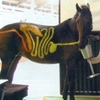|
Advice article filter
|
Digestive tractThe complicated digestive tract of a horse is susceptible for disorders. In the following paragraphs we take a closer look at several disorders. We will also explain how you can recognize these disorders, what you can do about it, and what you can do to avoid these problems as much as possible. Oral cavity Horses that suddenly loose a lot of weight, or get a dull coat all of a sudden, may have problems with their digestion. On of the main causes for a digestion problem lies in the oral cavity (bad teeth, inflammations). Chewing problems: the molars of a horse will gradually wear off because of the grinding way of mastication. Asymmetrical wear and tear will leave sharp hooks on the molars. These sharp hooks cause sores on the tongue and/or the inside of the cheek, which will make chewing painful. Your horse will start chewing less thoroughly, hence the weight loss. What can I do? Ask your equine dentist to do a checkup at least once a year. Horses with irregular teeth should have a checkup twice a year. Your equine dentist will determine the necessary treatment for your horse. Rasping will level the teeth so they will fit closely together again and eliminate the sharp hooks that hurt tongue or gums. The esophagus The esophagus seems to have only one important function in the body—to carry food, liquids, and saliva from the mouth to the stomach. When a horse gobbles down his food and doesn’t chew his food properly, large pieces of food (such as carrots or beet pulp) may get stuck in the esophagus, which can be very painful. What can I do? Sometimes a light massage of the esophagus is sufficient to stimulate the horse to swallow. However, don’t wait too long to call your veterinarian; the more often a horse chokes, the bigger the chance of fluid entering his lungs and the horse getting pneumonia.
Stomach The stomach is probably the most sensitive part of the horse’s body. Horses only produce saliva when they are chewing. Saliva is necessary to dilute the potent gastric juices. It doesn’t take much chewing to consume concentrated feeds. Consequently a horse cannot produce sufficient saliva to weaken down those gastric juices when eating large portions of concentrated feed. The gastric juices will become too potent and in time will cause ulcers. Overeating is another cause of common stomach disorders. Food items such as beet pulp will expand when they come into contact with fluids. The gastric juices may cut off the entrance to the stomach. The exit from the stomach to the intestines may also be blocked, and the horse can neither throw up (because of the one-way valve between esophagus and stomach), nor have a bowel movement. This can cause big problems. We can identify a stomach overload when the horse doesn’t have a bowel movement over a long period of time. A healthy horse has about 15 to 24 bowel movements per 24 hours. Constipation will cause pain, and the horse will display symptoms of colic. A lack of exercise can also lead to constipation.
Colic Colic is a generic term for abdominal pain. Intestinal obstructions or constipations, accumulation of gas or displacements can occur at several places in the digestive tract of a horse, often resulting in colic.
How do we recognize colic? A horse has colic when he exhibits more than a few of the following symptoms
What can I do? Acute colic Prone to colic

|

